City resilience describes the capacity of cities to function, so that the people living and working in cities — particularly the poor and vulnerable — survive and thrive no matter what stresses or shocks they encounter. Communicating information about these stresses, shocks, and responses to them is at the heart of RNI. Our tools promote inclusion by creating a platform for broad consultation and engagement of communities, especially vulnerable and marginalized groups.
RNI adopts the Rockefeller Foundation's “City Resilience Framework” to show how use of our tools can build resilience broadly across sectors, locations, and communities. Below are examples of tools using Ushahidi software and how they respond to specific aspects of the City Resilience Framework.
RNI is "sector agnostic" and responds to several key factors that contribute to a city’s resilience. While one city may need to focus on public health issues and another the economy, both will need to engage citizens, gather data, and communicate information about responses. RNI builds the pipeline for this communication.
Leadership & Strategy
Effective Leadership and Management
- FixYourStreet was established by local councils in Dublin to collect citizen feedback for non emergency service delivery needs such as graffiti, road defects, issues with street lighting, water leaks/drainage issues, and litter or illegal dumping. All reports are responded to within two business days
- Pilas Con El Voto is an Ushahidi deployment of Colombia’s Misión de Observación Electoral to monitor national elections and ensure the right of every citizen to participate in the establishment, exercise, and control of political power.
Empowered Stakeholders
- Harrassmap allows for anonymous reports of sexual assault in Cairo: therefore capturing data about a known, but little addressed, issue. The map has become an important advocacy tool and grown into a non-governmental organization that supports offline community mobilization campaigns to break-down social misconceptions about sexual assault and challenge the acceptability of this behavior. See research about Harassmap here.
Integrated Development Planning
- Maker Cities allows people to build ideas about the future of their city together inside a game. Maker cities is a platform for anyone to share creative responses to challenging problems and move towards action is by having fun and sharing ideas.
- The International Organization for Migration in Libya used our software to communicate locations of their programming; statistics about migration; and regular situation reports to promote cross-sectoral leadership and situational awareness at the height of the crisis in 2011.
Economy & Society
Social Stability and Security
- Uchaguzi was a joint initiative to monitor the 2013 elections in Kenya. They deployed Ushahidi to enable citizens, civil society, election observers, law enforcement agencies and humanitarian response agencies to monitor election incidents in real-time and take action where necessary. See editorial in the New York Times.
Collective Identity and Mutual Support
- Voice of Kibera uses Ushahidi to enhance resilience through community led actions. What began as a way to give collective global voice to the residents of Africa’s largest slum in Nairobi, has become the most authoritative dataset about the challenges faced by Kibera’s residents, their existing capacity (e.g. clinics, schools, water resources), and other relevant news and information about the slum.
Urban Systems & Services
Reliable mobility and communications
- FirstToSee is an emergency support system developed with counties, regional ports, and emergency response agencies in and around Puget Sound, Washington, to collect, filter, and map information from a variety of social media sources for better situational awareness in emergencies or disasters. The FirstToSee mobile app provides the public with new tools for communicating directly with responders and send emergency reports and photos from their smartphones or tablets.
- Water Tracker (blog post) is a non-public Ushahidi platform for monitoring water-wells in Afghanistan as part of a USAID project. The system allowed for anyone to report a broken well via SMS or voice in a variety of languages in a very challenging environment. Reports were automatically relayed to local contractors to repair the wells quickly. The system has proven so effective that the Afghan National government has begun using it as part of a broader national water plan.
- Sinsai Info was a platform for citizen reporting during the 2011 Tōhoku earthquake and tsunami in Japan and an important additional source of information during a time when cell networks where overloaded. The embassy community in Tokyo leveraged the crisis map to identify their citizens in the Tōhoku region.

